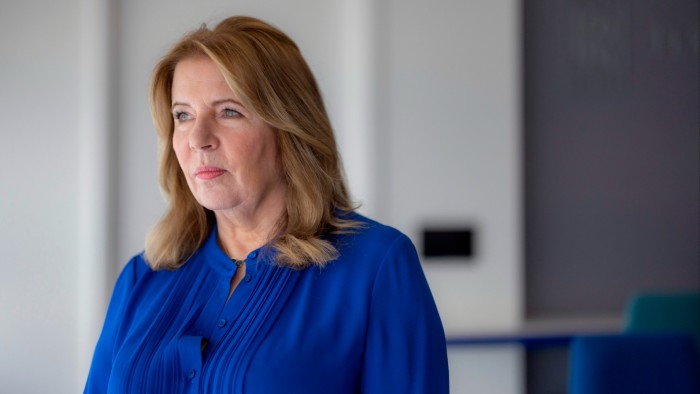Unlock the Editor’s Digest for free
Roula Khalaf, Editor of the FT, selects her favourite stories in this weekly newsletter.
At least once a month, employees at Rolls-Royce can gain an insight into the lives of one of their colleagues. Posted on the intranet of the British FTSE 100 group, under the banner “Being Like Me”, employees share their personal experience of everything from coming out to what it is like living with physical differences.
Colleagues have the opportunity to write stories about “what makes them who they are”, explains Natasha Whitehurst, the company’s head of diversity, inclusion and belonging.
The initiative, she says, allows people to “come to work and not necessarily feel that they have to edit themselves when they walk through the door”. The company, she adds, has done a lot of work to allow people to be “open and honest” — which, in turn, helps to foster inclusion as well as “psychological safety” among employees.
Launched in 2022, these “stories” are among several initiatives that the aerospace and defence group uses to help promote a safe and inclusive working environment.
The 118-year-old company, one of the UK’s most famous engineering brands, employs around 50,000 people in more than 50 countries. It is best known for the engines that power some of the world’s biggest civil aircraft, such as the Airbus A350. The group also builds engines for fighter jets, as well as nuclear reactors to power submarines.
Rolls-Royce, 10th in this year’s FT/Statista ranking, stands out among its counterparts as scoring highly on diversity and inclusion metrics. Traditionally, manufacturing companies, especially those in sectors with a heavy bias towards Stem (science, technology, engineering and maths) skills, have struggled to recruit people from diverse backgrounds. Women, in particular, have often proved difficult to retain before they reach senior positions.
“Those kinds of heavy engineering industries are still lacking in progress for women,” points out Ann Francke, chief executive of the UK’s Chartered Management Institute (CMI).
Figures from trade body EngineeringUK show that the number of women working in engineering and technology dropped from 16.5 per cent of the workforce in 2022 to 15.7 per cent in 2023 — an indicator that women are not being retained.
While there has been much progress in promoting women to boards, companies need to ensure there are “women in senior levels and women making the step up from junior to middle managers . . . in order to ensure retention”, says Francke.
Rolls-Royce appointed Anita Frew as its first female chair three years ago, a development that was regarded as a milestone both for the company and the industry. The group has since reached gender parity on its board and increased the number of women in its executive team.
While Frew earlier this year acknowledged that Rolls-Royce had “more work to do at lower levels in the organisation”, she said the company recognised the “importance of setting both an example at board level and clear expectations throughout our company and our industry”.
Whitehurst says she was struck by the “passion and enthusiasm” towards promoting diversity, inclusion and belonging at Rolls-Royce when she joined just over two years ago.
There was a lot of “great activity” taking place through various initiatives, she says, including employee inclusion networks and Stem-focused outreach programmes. Since then, the company has begun to mature its approach into one that is more systemic.
“We are hardwiring [diversity, inclusion and belonging] into everything we do — that is the real switch for us, taking this holistic approach,” says Whitehurst, adding that diversity policies are regarded as a “strategic priority”.
In the medium-term, that means focusing on how to promote a psychologically safe environment and how to strengthen the skills and engagement of the company’s leaders when it comes to diversity and inclusion. “We see inclusion as a skill,” stresses Whitehurst.
With definitions of diversity now spanning not just gender and race but also education, economic background and neurodiversity, training is regarded as a critical tool by industry experts.
Research for the CMI found that trained and supportive managers who know what they are doing play a bigger role in creating inclusive workplaces than initiatives such as flexible working arrangements.
If you want to “really drive your results, you have to treat inclusion as a fundamental part of your business strategy,” says the CMI’s Francke. That manifests itself through “practising good line management, training your managers to behave inclusively”.
Industry experts are also keen to stress the link between strong diversity policies and business performance, following last year’s ruling by the US Supreme Court against affirmative action in university admission programmes. That decision triggered lawsuits targeting the diversity and inclusion programmes run by several companies.
The “fear of litigation in the US” has affected the outlook in Europe, says Francke. However, she believes that those companies that are properly committed to diversity are unlikely to change course. Diversity, she adds, is a “wonderful business strategy when you take it seriously, but it’s not effective if done on a surface ‘tick-box’ level”. “You will get better results. You will attract better talent and you will keep them longer.”
Read the full article here

